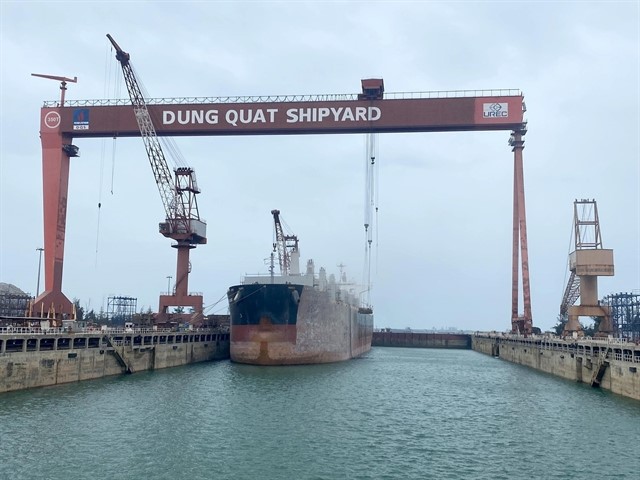Deputy Prime Minister Lê Minh Khái stressed the importance of quick, effective resolution and better-coordinated efforts by governmental bodies. To successfully restructure DQS, a clear and result-driven plan must be prepared, which possibly requires special mechanisms.

The restructuring of the Dung Quất Shipyard (DQS), a subsidiary of the Vietnam Oil & Gas Group (PVN), cannot be delayed any longer and progress and potential solutions must be reported to the Political Bureau on time, said Deputy Prime Minister Lê Minh Khái during a government meeting over poor-performing projects under the Ministry of Industry and Trade (MoIT) yesterday.
"The current plan is mostly about throwing together administrative procedures and therefore, lacking in substance. The root cause of the problems remains due to the lack of a comprehensive approach, which may take several more years to resolve," he said.
He stressed the importance of quick, effective resolution and better-coordinated efforts by governmental bodies. To successfully restructure DQS, a clear and result-driven plan must be prepared, which possibly requires special mechanisms.
He said the process of calculating assets, unfinished settlements, capital deficiency, accumulated losses and undervalued assets has been a tedious and lengthy one. While he acknowledged PVN's dedication and focus, Khái said going ahead with the restructuring without a carefully crafted plan would be a mistake.
The Commission for the Management of State Capital at Enterprises (CMSC) has been tasked with building a proposal to be submitted to the central government by March 25, in which optimal solutions for DQS must be feasible and efficient while minimising losses, waste and procedural sequences.
According to a report by PVN, DQS remains the only business unit under the group with a specialisation in ship repair and shipbuilding, which offers the shipyard a major advantage and opportunities to participate in PVN's value chain and the strategic development of the energy industry, especially when Viêt Nam has identified an urgent need to modernise its ageing fleets.
Therefore, the restructuring of DQS has many targets from improving its financial performance, enhancing competitiveness, increasing production capacity and training skilled workers for the country's shipbuilding industry.
Hồ Sỹ Hùng, deputy chairman of the CMSC, said a set of solutions for DQS has been proposed and accepted by PVN based on projected market demand and the shipyard's internal capacity for the 2023-35 period.
In the first scenario, with an average annual revenue of around VNĐ1.31 trillion (US$53 million) during the period, DQS can start restructuring and putting additional investment in shipbuilding.
In a more optimistic scenario, the shipyard's average annual revenue was estimated at VNĐ1.49 trillion, as well as an annual profit of VNĐ65 billion during the period.
To date, PVN has presented three restructuring plans for DQS, which have all been criticised and rejected by the central government and ministries due to poor feasibility, optimisation and a lack of definitive resolutions. To make matters worse, there is still no consensus on the proposed plans finalising of data, reporting figures, special mechanisms and handling debts, especially with lenders and related contractors.
Mai Thị Thu Vân, deputy head of the Government Office, said a DQS restructuring plan has been included in the 2024 working program of the Communist Party of Vietnam Central Committee and is scheduled to be submitted in the second quarter. According to the CMSC, the process of developing a plan for DQS has lasted ten years, spanning three Steering Committee terms, with multiple adjustments by PVN. She said both the commission and PVN need to be proactive and strictly follow the central government's directives.
A representative from PVN said immediately after receiving assets from the Shipbuilding Industry Corporation (Vinashin), a major failed project under the MoIT, DQS went bankrupt because it was not possible to repay Vinashin's due debts. In addition, the assets received from Vinashin were not part of PVN's development strategy and many of these failed to contribute to the group's economic activities. — VNS





